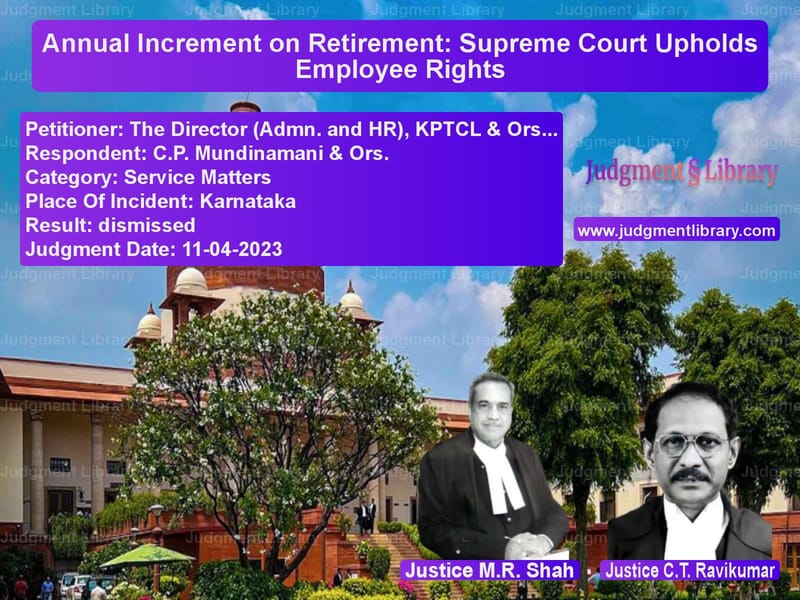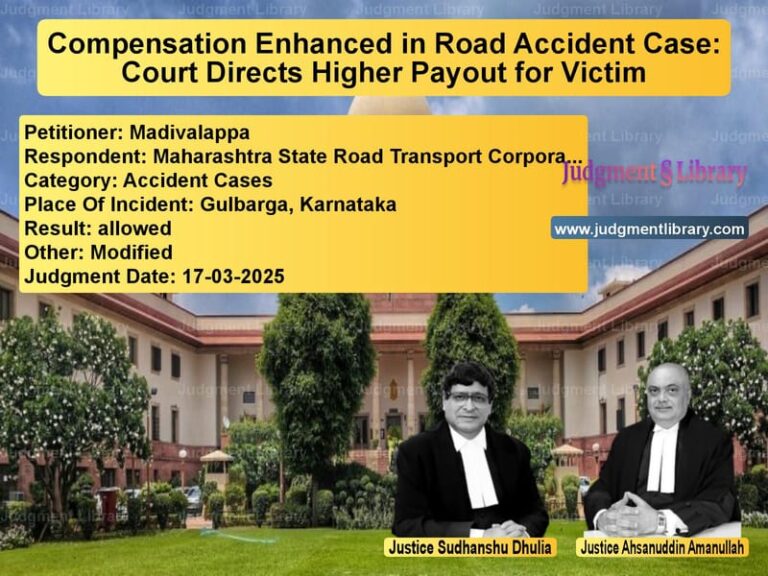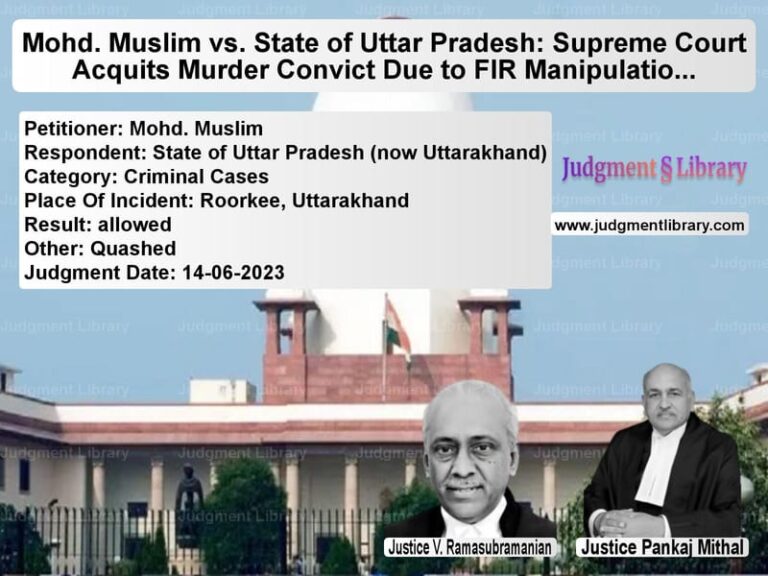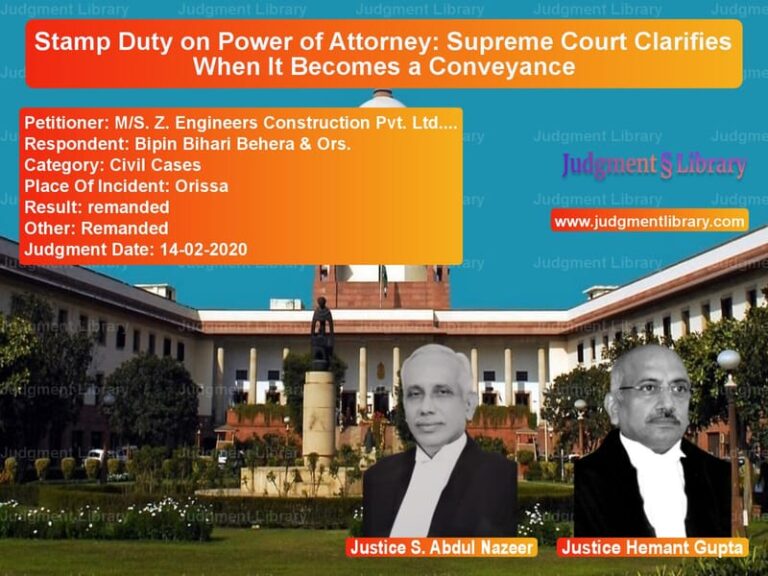Annual Increment on Retirement: Supreme Court Upholds Employee Rights
The Supreme Court of India, in the case of The Director (Admn. and HR), KPTCL & Ors. v. C.P. Mundinamani & Ors., delivered a significant ruling regarding the entitlement of government employees to receive an annual increment even if they retire the very next day. The Court upheld the Karnataka High Court’s decision, affirming that employees who have completed a full year of service are entitled to receive the annual increment they have earned, regardless of whether they retire on the following day.
Background of the Case
The case originated when employees of Karnataka Power Transmission Corporation Limited (KPTCL) retired on the very next day after completing a full year of service and were denied their last annual increment. The management cited Regulation 40(1) of the Karnataka Electricity Board Employees Service Regulations, 1997, arguing that an increment is only accrued on the following day, and since the employees had retired by then, they were not eligible.
The employees challenged this decision, and the Karnataka High Court ruled in their favor. The management, KPTCL, appealed to the Supreme Court.
Petitioner’s Arguments
Senior Counsel Huzefa Ahmadi, representing KPTCL, argued:
- The employees were not in service on the day the increment accrued; therefore, they had no legal right to claim it.
- As per Regulation 40(1), an increment accrues only on the following day after it is earned. Hence, employees retiring on that day are not entitled to the benefit.
- The concept of annual increments is meant as an incentive for future service, and since retired employees do not serve further, they should not receive it.
- The Andhra Pradesh High Court had previously ruled against granting increments in similar circumstances.
Respondent’s Arguments
The employees countered with the following arguments:
- Annual increments are earned for service already rendered over the past year and cannot be denied just because the employee retires the next day.
- Several High Courts, including those in Delhi, Allahabad, Madhya Pradesh, and Gujarat, have ruled that retirement does not disqualify an employee from receiving a duly earned increment.
- The denial of the increment was an arbitrary interpretation of the regulations and violates Article 14 of the Constitution, which ensures equality before the law.
- The increment was a part of their regular pay structure and should not be denied due to a technicality.
Key Legal Issues
The Supreme Court had to decide:
- Whether an employee who completes a full year of service but retires the next day is entitled to an annual increment.
- Whether Regulation 40(1) was being misinterpreted by KPTCL to deny employees their rightful dues.
- Whether annual increments should be considered as an earned benefit rather than a prospective incentive.
Supreme Court’s Observations
The Supreme Court ruled in favor of the employees, stating:
- “The increment is earned for service rendered during the preceding year. It is not a reward for future service but an acknowledgment of past performance.”
- “Merely because an employee retires on the day the increment accrues does not mean they should be denied what they have already earned.”
- “If an employee’s work and conduct over the year were satisfactory, they should not be penalized just because they retired.”
- “Several High Courts, including those in Delhi, Gujarat, and Allahabad, have ruled in favor of employees in similar cases, reinforcing the principle of fairness.”
The Court emphasized that increments are part of an employee’s regular pay progression and should not be withheld based on technical misinterpretations of regulations.
Final Judgment
The Supreme Court dismissed KPTCL’s appeal, upholding the Karnataka High Court’s decision. The ruling stated:
“The Division Bench of the High Court has rightly directed the appellants to grant one annual increment which the original writ petitioners earned on the last day of their service for rendering their services preceding one year from the date of retirement with good behavior and efficiency. We are in complete agreement with the view taken by the High Court.”
Impact and Legal Significance
This judgment sets an important precedent for all government and public sector employees, ensuring:
- Protection of earned benefits: Employees cannot be denied their rightful dues based on technicalities.
- Uniform interpretation of service regulations: Regulations must be read in a manner that ensures fairness and consistency.
- Employee rights under Article 14: The ruling reinforces the principle of equality and prevents arbitrary denial of benefits.
Conclusion
The Supreme Court’s decision in The Director (Admn. and HR), KPTCL & Ors. v. C.P. Mundinamani & Ors. upholds the principle that employees must not be unfairly deprived of the increments they have earned. The ruling provides much-needed clarity on service regulations and ensures that government employees receive the financial benefits they are entitled to upon retirement.
Petitioner Name: The Director (Admn. and HR), KPTCL & Ors..Respondent Name: C.P. Mundinamani & Ors..Judgment By: Justice M.R. Shah, Justice C.T. Ravikumar.Place Of Incident: Karnataka.Judgment Date: 11-04-2023.
Don’t miss out on the full details! Download the complete judgment in PDF format below and gain valuable insights instantly!
Download Judgment: the-director-(admn.-vs-c.p.-mundinamani-&-o-supreme-court-of-india-judgment-dated-11-04-2023.pdf
Directly Download Judgment: Directly download this Judgment
See all petitions in Pension and Gratuity
See all petitions in Public Sector Employees
See all petitions in Employment Disputes
See all petitions in Judgment by Mukeshkumar Rasikbhai Shah
See all petitions in Judgment by C.T. Ravikumar
See all petitions in dismissed
See all petitions in supreme court of India judgments April 2023
See all petitions in 2023 judgments
See all posts in Service Matters Category
See all allowed petitions in Service Matters Category
See all Dismissed petitions in Service Matters Category
See all partially allowed petitions in Service Matters Category







